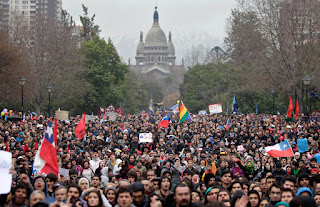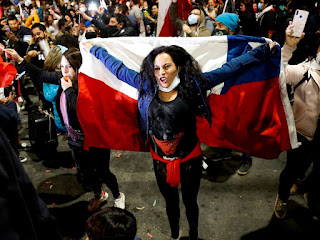Salvador Allende, the socialist President of Chile from 1970 to 1973 gave priority to fight against poverty and inequality. General Pinochet, in collusion with local oligarchs and the US government, overthrew Allende in a bloody coup. Besides bombing the Presidential palace with airforce, Pinochet followed up with systematic killing and disappearance of thousands of leftists, student and trade union leaders and liberal intellectuals. In 1980, he imposed a neoliberal constitution which promoted and protected capitalism and privatized education, healthcare, water rights, utilities and pensions. This helped the private market to grow its profit freely while depriving poor and lower middle class access to education and healthcare. After the restoration of democracy in 1990, some amendments were made to the constitution. The socialist governments tried major amendments but they were blocked by the right wing coalition. The trade unions, students and the marginalised population took to the streets from time to time against social injustice. These were contained with the heavy hand of security forces. But when the conservative government of billionaire President Pinera increased the cost of metro tickets by 30 pesos in October 2019, it became the tipping point. The protestors escalated the violence and paralysed daily life. Driven to the wall, the Pinera government sat with the protest leaders and agreed to their demand for a new constitution, among other things.
The result of elections held on 15-16 May for the 115 membership of the new constituent assembly is like a political earthquake. As someone put it aptly, “ the social uprising in Chile is "not about 30 pesos, it's about 30 years." The voters have punished the two coalitions, both rightist and leftist, which have ruled the country for the last 30 years. Independent candidates have secured 48 seats, the left 28, the centre-left 25, and the right-wing coalition 37. The independents are mostly those who lead the protests. Many of them are left-wing community organizers and activists of traditional left-wing causes, including environmentalists, feminists, public housing advocates and community organizers.
The remaining 17 seats go to the indigenous people of Chile, whose existence or rights were simply ignored by the Pinochet constitution, one of the only constitutions in Latin America that doesn’t acknowledge Indigenous people. The indigenous constitute 13% of the population. This is the first time ever the indigenous have been recognized and given guaranteed representation.
The new constitutional body is the first in the world to stipulate a roughly equal number of male and female delegates. A total of 699 women and 674 men stood in the elections. The women have got 77 seats and the men 78. The gender parity idea was opposed by right wing parties but it was overruled by the Congress.
The sound defeat of the right wing, reduced to just 37 seats mean that they cannot block the proposals passed by two third majority. The 20% of the vote got by President Pinera’s ruling “Chile Vamos” coalition is its worst electoral performance since democracy was restored in 1990.
Along with this election, there were also simultaneous elections for 16 regional governors, 345 mayors and 2,240 municipal councilors for the period 2021-2025. Although the final results of these elections will not be known until the end of the week, the preliminary results indicate a similar blow to the governing coalition, which lost important mayors offices and regional governments. Meanwhile, the left-wing parties retained their municipalities and gained several others across the country, including in the capital Santiago. The communists doubled their mayoralties to six. The most significant victory was that of Irací Hassler in the symbolically significant commune of Santiago Centro, in the capital. She defeated the current right-wing mayor, Felipe Alessandri.
Both the leftist and rightist coalitions which have ruled Chile in the last three decades have acknowledged their defeat. President Pinera said, “the citizens have sent a clear and strong message to the government and also to all traditional political forces. We are not adequately tuning in with the demands and desires of the citizens. We are being challenged by new expressions and leadership. It is our duty to listen with humility and attention to the message of the people. It is a great opportunity for Chileans to build a more fair, inclusive, prosperous and sustainable country”.
The Chilean neoliberal experiment, protests and end of neoliberalism should be a lesson for Colombia, Peru, Ecuador and other countries in Latin America which have seen such protests against inequality. The Chileans have shown how the social disparity could be tackled democratically and relatively peacefully without too much bloodshed
The new constituent assembly will draft a constitution within twelve months. Because the convention will have a veto-proof left-wing majority, the new constitution will likely include many of the long lists of social rights that those candidates campaigned on, including the right to housing, education, health and, most importantly, a public pension system to replace the private saving accounts. Greg Grandin, a world-renowned historian of Latin America, tweeted, "Allende is smiling. Neoliberalism started in Chile. It will end in Chile”.






No comments:
Post a Comment